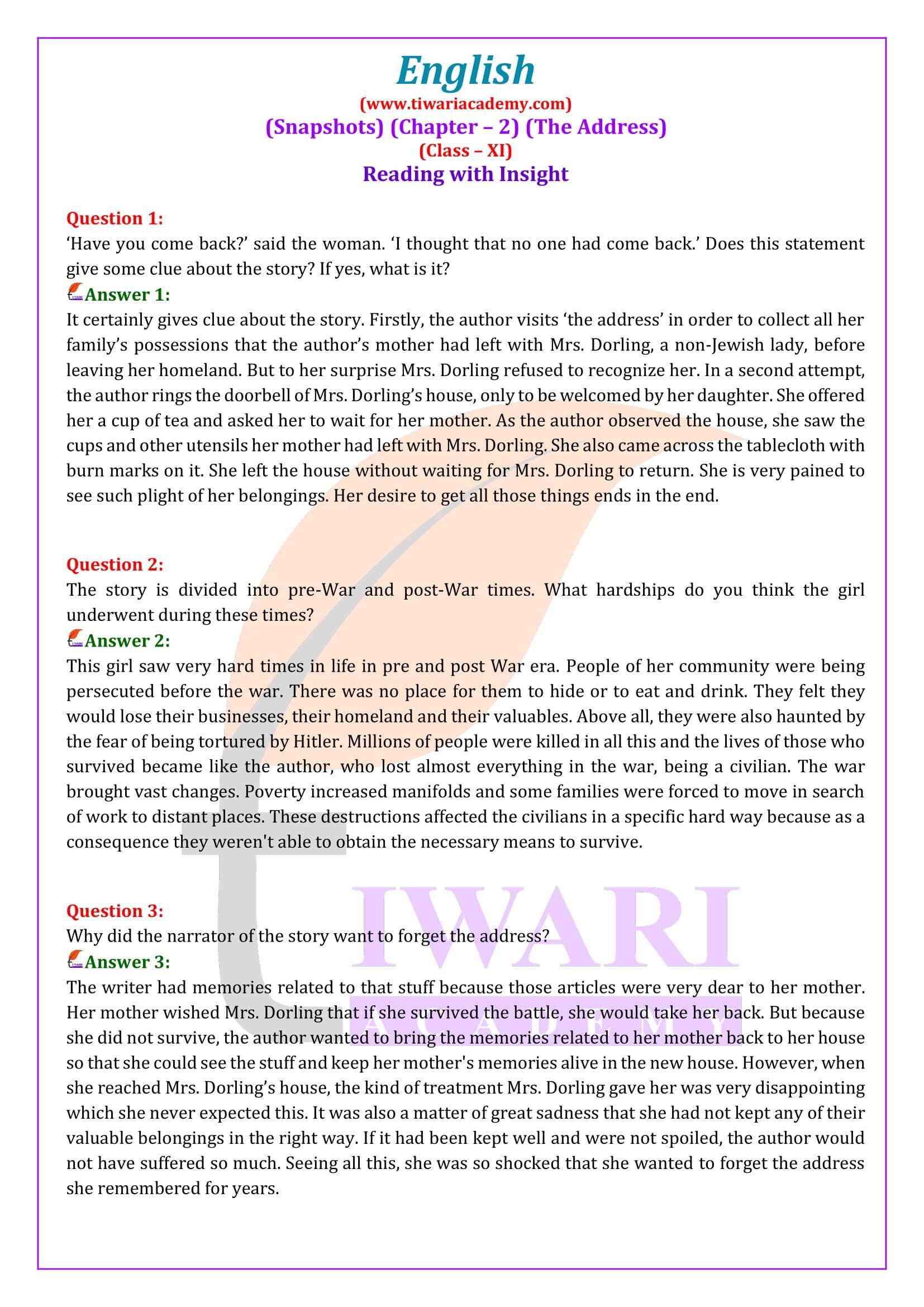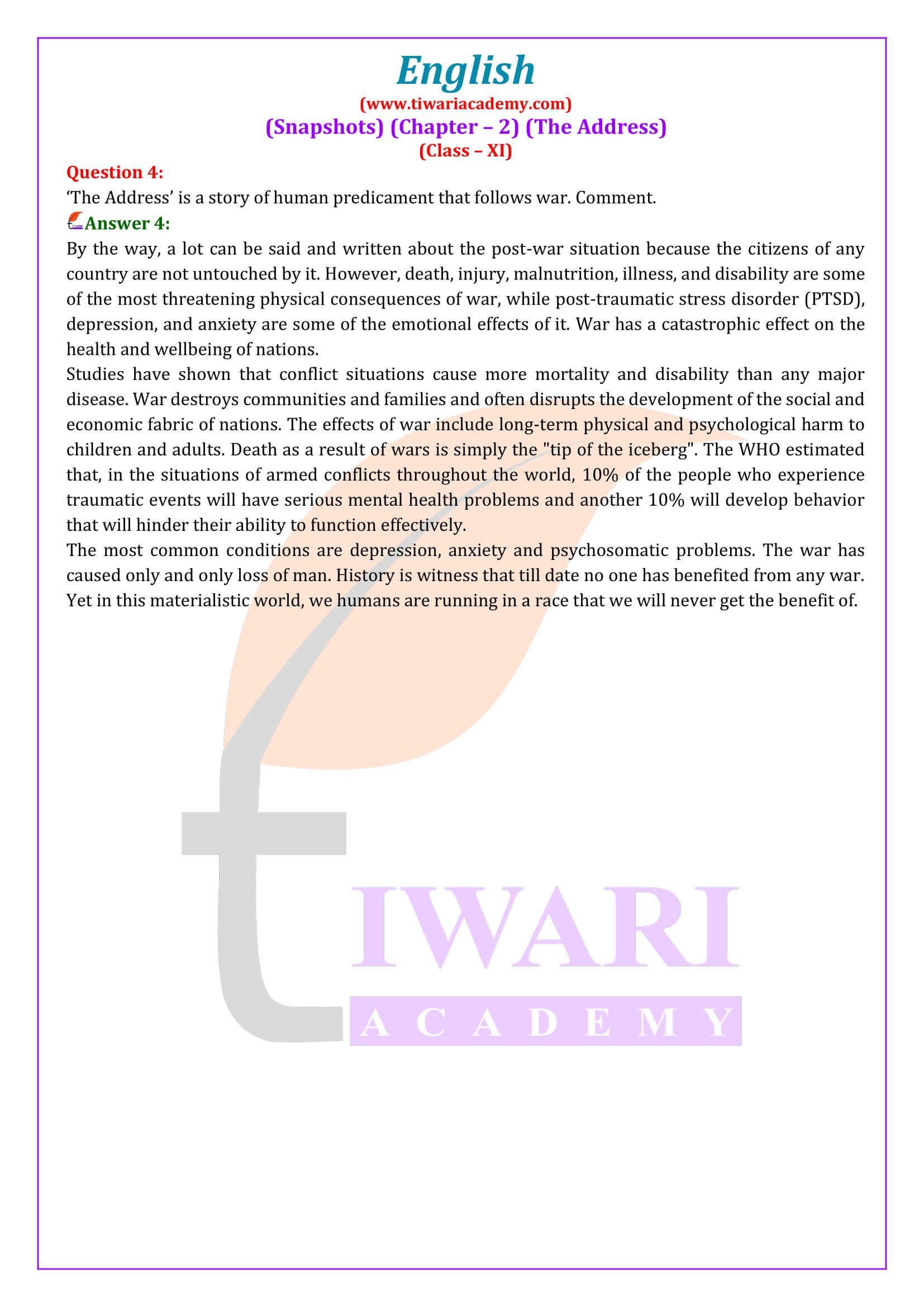NCERT Solutions for Class 11 English Snapshots Chapter 2 the Address presented by Marga Minco for session 2024-25. Get here study material and practice questions of Class 11 English Supplementary Reader Chapter 2 to help in revision during the exams.
Class 11 English Snapshots Chapter 2 The Address Question Answers
Have you come back? said the woman. I thought that no one had come back. Does this statement give some clue about the story? If yes, what is it?
It certainly gives clue about the story. Firstly, the author visits ‘the address’ in order to collect all her family’s possessions that the author’s mother had left with Mrs. Dorling, a non-Jewish lady, before leaving her homeland. But to her surprise Mrs. Dorling refused to recognize her. In a second attempt, the author rings the doorbell of Mrs. Dorling’s house, only to be welcomed by her daughter. She offered her a cup of tea and asked her to wait for her mother.
As the author observed the house, she saw the cups and other utensils her mother had left with Mrs. Dorling. She also came across the tablecloth with burn marks on it. She left the house without waiting for Mrs. Dorling to return. She is very pained to see such plight of her belongings. Her desire to get all those things ends in the end.
The story is divided into pre-War and post-War times. What hardships do you think the girl underwent during these times?
This girl saw very hard times in life in pre and post War era. People of her community were being persecuted before the war. There was no place for them to hide or to eat and drink. They felt they would lose their businesses, their homeland and their valuables. Above all, they were also haunted by the fear of being tortured by Hitler.
Millions of people were killed in all this and the lives of those who survived became like the author, who lost almost everything in the war, being a civilian. The war brought vast changes. Poverty increased manifolds and some families were forced to move in search of work to distant places. These destructions affected the civilians in a specific hard way because as a consequence they weren’t able to obtain the necessary means to survive.
Why did the narrator of the story want to forget the address?
The writer had memories related to that stuff because those articles were very dear to her mother. Her mother wished Mrs. Dorling that if she survived the battle, she would take her back. But because she did not survive, the author wanted to bring the memories related to her mother back to her house so that she could see the stuff and keep her mother’s memories alive in the new house.
However, when she reached Mrs. Dorling’s house, the kind of treatment Mrs. Dorling gave her was very disappointing which she never expected this. It was also a matter of great sadness that she had not kept any of their valuable belongings in the right way. If it had been kept well and were not spoiled, the author would not have suffered so much. Seeing all this, she was so shocked that she wanted to forget the address she remembered for years.
The Address is a story of human predicament that follows war. Comment.
By the way, a lot can be said and written about the post-war situation because the citizens of any country are not untouched by it. However, death, injury, malnutrition, illness, and disability are some of the most threatening physical consequences of war, while post-traumatic stress disorder (PTSD), depression, and anxiety are some of the emotional effects of it. War has a catastrophic effect on the health and wellbeing of nations.
Studies have shown that conflict situations cause more mortality and disability than any major disease. War destroys communities and families and often disrupts the development of the social and economic fabric of nations. The effects of war include long-term physical and psychological harm to children and adults. Death as a result of wars is simply the “tip of the iceberg”. The WHO estimated that, in the situations of armed conflicts throughout the world, 10% of the people who experience traumatic events will have serious mental health problems and another 10% will develop behavior that will hinder their ability to function effectively.
The most common conditions are depression, anxiety and psychosomatic problems. The war has caused only and only loss of man. History is witness that till date no one has benefited from any war. Yet in this materialistic world, we humans are running in a race that we will never get the benefit of.




